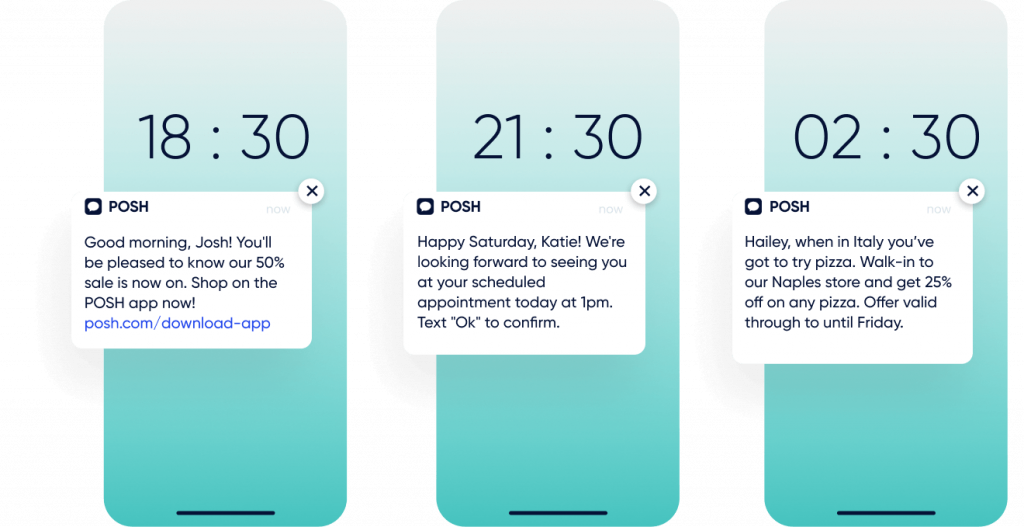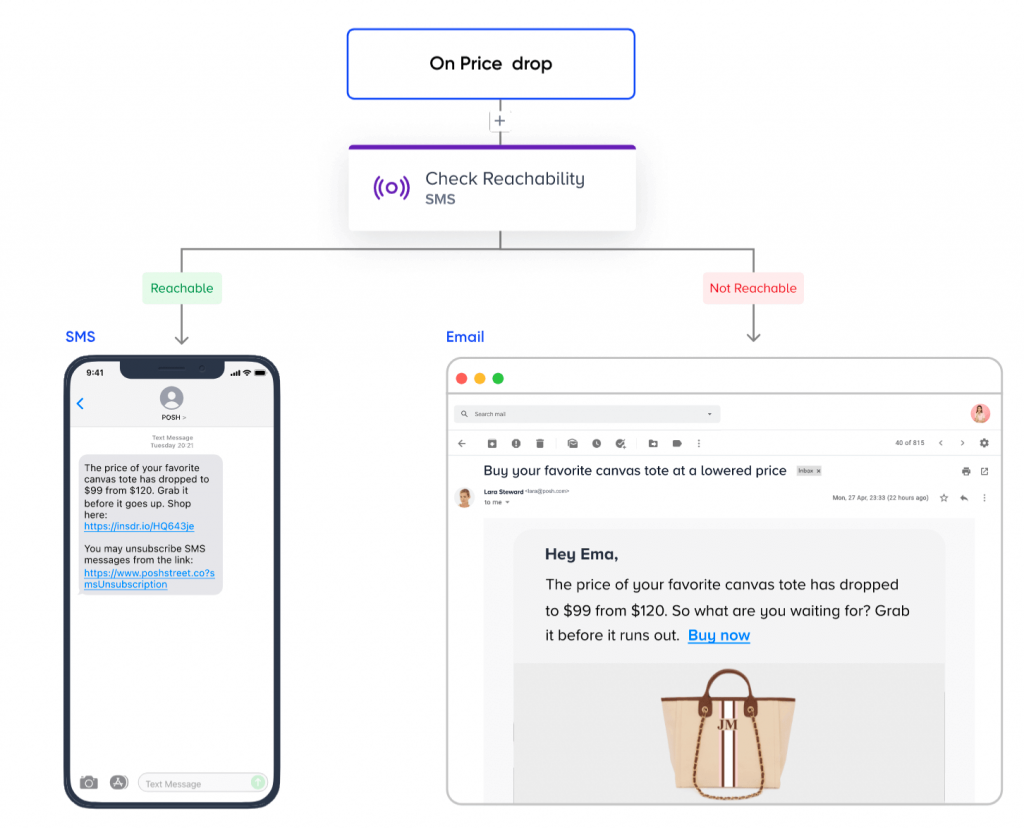SMS Campaign
An SMS campaign is a targeted marketing strategy in which you send promotional or informational messages to a group of recipients via the Short Message Service (SMS). You can use SMS campaigns to instantly reach customers, such as sending spring sale alerts to opt-in shoppers or sending appointment reminders to service clients.
For example, you might notify subscribers about a flash sale and include a direct purchase link to drive immediate engagement and action.
Why use SMS Campaigns?
- SMS messages have significantly higher open rates than emails, making recipients more likely to see the content promptly.
- SMS messages are usually delivered instantly, ensuring time-sensitive information reaches recipients quickly.
- SMS offers a one-to-one communication channel, allowing businesses to engage with customers in a personal and highly targeted way.
- SMS campaigns require recipients to opt-in before receiving messages, ensuring compliance with regulations and respecting user preferences. Recipients can also easily opt-out at any time.
What is SMS Marketing?
SMS marketing, also known as text message marketing, is a form of mobile marketing that enables businesses to communicate directly with customers, subscribers, or members via their mobile phones. This direct channel allows brands to engage their audience quickly and personally.
SMS marketing is permission-based, meaning recipients have opted in to receive messages. People usually subscribe through channels such as website sign-ups, mobile apps, or keyword-based opt-ins.
Key Features of SMS Marketing
- Personalized messages: SMS marketing allows businesses to address recipients by name, creating a more personal and meaningful connection.
- Time-sensitive promotions: With high open rates and instant delivery, SMS is ideal for flash sales, limited-time offers, and other time-sensitive promotions.
- Customer engagement: SMS campaigns can facilitate two-way communication, enabling recipients to respond, provide feedback, or participate in surveys.
- Offers and discounts: Businesses can share mobile coupons or discount codes that are easy for recipients to redeem online or in-store.
- Event reminders and notifications: SMS is effective for sending appointment confirmations, delivery updates, event reminders, and other time-critical information.
- Customer support: SMS can provide quick support, such as order updates, FAQs, or urgent announcements.

SMS Marketing vs. SMS Campaigns
- SMS Marketing refers to the overall strategy of using text messaging to engage customers, deliver promotions, and support broader marketing goals. This includes automated flows, transactional alerts, and multi-step campaigns.
- SMS Campaigns are specific, time-bound initiatives within SMS marketing, aimed at achieving a particular objective—such as a flash sale, abandoned cart reminder, or event notification.
In short, Every SMS campaign is part of SMS marketing, but not all SMS marketing is made up of campaigns.
How to Create an SMS Campaign?
- Set Clear Goals: Define what success looks like, whether it’s boosting sales, driving traffic, promoting an event, or building awareness.
- Build a Compliant List: Collect explicit opt-ins across channels and import your subscriber base into your SMS platform.
- Craft & Schedule Messages: Write short, clear, and action-oriented texts. Add personalization to increase engagement.
- Segment Your Audience: Target groups based on behavior, demographics, or preferences to maximize relevance.
- Test Before Launch: Send to a small sample first, verify links and CTAs, then roll out to your full audience.
- Measure & Optimize: Track delivery, open, click-through, and conversion rates. Use insights and A/B testing to improve future campaigns.

How to Track SMS campaigns
While every platform is different, if you choose Insider as your SMS marketing platform, its simple interface and dashboard make creating SMS campaigns quick and easy.
To track your campaign performance, you need to define what goals you have for the campaign. Do you want a higher AOV? Is the goal product awareness? Do you want to reduce cart abandonment? Once this is determined, you can closely monitor the campaign’s delivery rates, open rates, click-through rates, and conversion rates using Insider’s reporting and analytics dashboard.
It’s also worth conducting A/B tests to experiment with different elements of the SMS campaign, such as message content, CTAs, and sending times, leveraging Insider’s A/B testing capabilities. Regularly analyze the campaign’s performance to identify successful strategies and areas for improvement, enabling you to optimize future SMS campaigns to hit key goals.
SMS Campaign vs. Push Notification vs. Email Campaign
| Feature | SMS Campaign | Push Notification | Email Campaign |
| Autonomy | Manual/Automated | Automated | Manual/Automated |
| Context | Highly personalized, brief | App/state-driven | Rich formatting, longer |
| Integration | E-commerce, CRM, cross-channel | Mobile/web apps | Web/ecommerce, CRM |
| Learning | Segment & A/B test | Limited | Automated/personalization |
| Example | “Flash Sale, today only!” | “Your order shipped!” | “Monthly newsletter” |
FAQs
To obtain consent for SMS campaigns, recipients must opt in through sign-up forms, by replying with a keyword (e.g., “Text YES to 12345”), or via double opt-in flows, ensuring compliance with regulations such as the TCPA.
SMS marketing is the overarching strategy for using text messages to engage customers, drive promotions, and support business goals. An SMS campaign is a specific, time-bound execution with a defined audience and objective, like a flash sale or appointment reminder.
See Insider’s SMS Marketing vs Campaign for a detailed comparison.
Yes. SMS campaigns can be fully automated using behavioral triggers, like cart abandonment, purchase anniversaries, or engagement milestones, allowing you to deliver timely, personalized messages to each customer. Discover best practices and strategies in the SMS Automation Strategies guide.
Always obtain explicit opt-in from recipients, provide clear opt-out options, and follow applicable laws and carrier rules, such as GDPR and TCPA. For complete guidance, see Insider’s SMS Content Guidelines.












